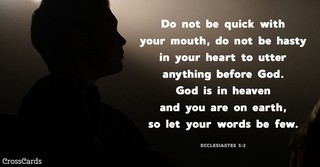
Change Translation
- Recent Translations
- All Translations
Images for Ecclesiaste 5:17

Ecclesiaste 5:17 Meaning and Commentary
All his days also he eateth in darkness
To all that has been said is added another evil, that attends such whose hearts are inordinately set on riches; that all their days, throughout the whole of their lives, they live a most uncomfortable life; for eating is here put for their whole manner of living: such not only eat coarse bread, and very mean food of any sort, but wear sordid apparel, and live in a poor cottage, in a very obscure and miserable manner. Aben Ezra understands it literally of the night, to which time such a man defers eating, that he might lose no time in his labour; and that it might not be seen what sort of food he eats, and how sparingly, and that others might not eat with him; and what he does eat is not eaten freely, but grudgingly, and with anguish and distress of mind, without any real pleasure and joy; and much less with the light of God's countenance, the discoveries of his love, and communion with him: the Targum is,
``all his days he dwelleth in darkness, that he may taste his bread alone;''and [he hath], much sorrow and wrath with his sickness;
either the sickness of his mind, his covetousness; or the sickness of his body, emaciated by withholding from himself the necessaries of life: or when he comes upon a sick bed, he is filled with sorrow and indignation, that he must live no longer, to accumulate more wealth, and accomplish his projects and designs; and that he must leave his wealth, he has been at so much pains to gather together. Or, "and he is much angry" {o}; when things do not answer in trade according to his wishes; when his substance diminishes, or, however, does not increase as he desires; when he is cheated by fraudulent men, or robbed by thieves: "and he hath sickness" F16; either of body or mind, or both, because matters do not succeed as he would have them; and through fretfulness at losses and crosses, and disappointments; and through cares in getting and keeping what he has: "and wrath"; at all about him, whom he is ready to charge with slothfulness or unfaithfulness to him; and even at the providence of God, that does not give him the desired success; so that he has no manner of pleasure and comfort in life.
F15 (hbrh oekw) "et irascitur multum", Vatablus, Drusius; "et indignatus fuit, vel indignatur multum", Piscator, Rambachius.
F16 (wylxw) "et agritudo ei fuit, vel est", Piscator, Drusius; "vel fuerit", Gejerus.
Ecclesiaste 5:17 In-Context
Study Tools
PLUSUnlock Notes
This feature is for PLUS subscribers only. Join PLUS today to access these tools and more.
JOIN PLUSUnlock Highlights
This feature is for PLUS subscribers only. Join PLUS today to access these tools and more.
JOIN PLUSUnlock Bookmarks
This feature is for PLUS subscribers only. Join PLUS today to access these tools and more.
JOIN PLUSTrack Your Reading
Create a free account to start a reading plan, or join PLUS to unlock our full suite of premium study tools.